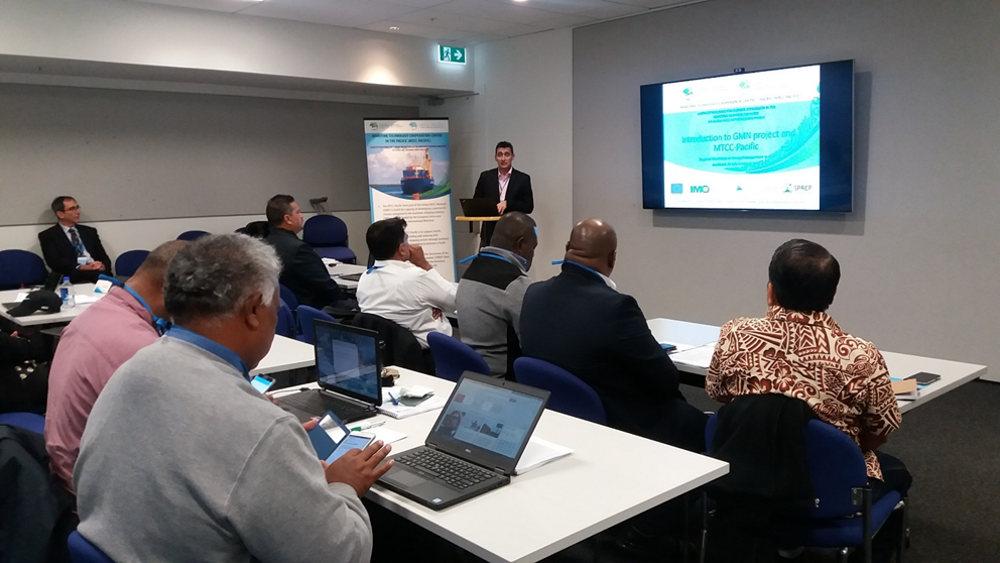MTCC-Pacific Head and Deputy Director of the Transport Programme, Thierry Nervale delivering the opening address.
Directors, Chief Executive Officers and managers from nine Pacific Island countries ports and administrations convened today for the Maritime Technology Cooperation Centre in the Pacific (MTCC-Pacific) Regional Workshop on Energy Management in Ports in, Auckland, New Zealand.
An energy audit conducted by the Pacific Community (SPC) in the port of Suva, Fiji, in 2016, showed a production of 3,100 tonnes of Greenhouse Gas (CO2-e) energy which was the Port’s third highest expense, after labour and machinery.
Approximately 25 kg CO2-e are produced per container in Suva port, slightly lower than the 2013 reported 30 kg CO2-e/container for 42 ports in the world. However, the energy audit demonstrated that an energy management system associated to short-term energy saving projects could result in a reduction of 440 tonnes CO2-e of greenhouse gas per year with 3-years recovered costs.
The aim of this two and a half day regional workshop is to provide the participants with an understanding of energy consumption in ports and with tools and methods to monitor and reduce energy consumption and greenhouse gas emissions from port operations.
“Reducing energy consumption from port operations will contribute to the overall objective of reducing greenhouse gas emissions from the Pacific maritime sector. MTCC-Pacific is established to build the capacity of Pacific Islands countries and lead by example in this goal,” said Head of MTCC-Pacific, SPC’s Deputy Director Transport, Thierry Nervale.
MTCC-Pacific is one of the five centres of excellence in the world and forms part of the Global MTCC Network that aims at building the capacity of developing countries for climate mitigation in the maritime shipping industry.
The vision of MTCC-Pacific is a Pacific low-carbon maritime transport that supports the sustainable development goals of Pacific Islands countries and territories. MTCC-Pacific provides capacity-building activities and implement pilot-projects to facilitate the implementation of energy efficient measures in the maritime industry.
“SPC in collaboration with the Secretariat of the Pacific Regional Environment Programme (SPREP) are the hosting institutions of MTCC-Pacific and are proud to partner in this project funded by the European Union and implemented by the International Maritime Organization (IMO),” Said Mr Nervale.
Several ports are already committed with the support of MTCC-Pacific to implement energy management systems and reduce greenhouse gas emissions from their operations. This is demonstrated by the high-level representation from Pacific ports and administrations at the workshop including the attendance of the Honourable Poasi Tei, Tonga Minister for Public Enterprises.
The MTCC-Pacific Regional Workshop for Energy Management in Port will be followed by the 42nd Conference of the Pacific Maritime Transport Alliance.
Directors, Chief Executive Officers and managers from nine Pacific Island countries ports and administrations convened today for the Maritime Technology Cooperation Centre in the Pacific (MTCC-Pacific) Regional Workshop on Energy Management in Ports in, Auckland, New Zealand.
An energy audit conducted by the Pacific Community (SPC) in the port of Suva, Fiji, in 2016, showed a production of 3,100 tonnes of Greenhouse Gas (CO2-e) energy which was the Port’s third highest expense, after labour and machinery.
Approximately 25 kg CO2-e are produced per container in Suva port, slightly lower than the 2013 reported 30 kg CO2-e/container for 42 ports in the world. However, the energy audit demonstrated that an energy management system associated to short-term energy saving projects could result in a reduction of 440 tonnes CO2-e of greenhouse gas per year with 3-years recovered costs.
The aim of this two and a half day regional workshop is to provide the participants with an understanding of energy consumption in ports and with tools and methods to monitor and reduce energy consumption and greenhouse gas emissions from port operations.
“Reducing energy consumption from port operations will contribute to the overall objective of reducing greenhouse gas emissions from the Pacific maritime sector. MTCC-Pacific is established to build the capacity of Pacific Islands countries and lead by example in this goal,” said Head of MTCC-Pacific, SPC’s Deputy Director Transport, Thierry Nervale.
MTCC-Pacific is one of the five centres of excellence in the world and forms part of the Global MTCC Network that aims at building the capacity of developing countries for climate mitigation in the maritime shipping industry.
The vision of MTCC-Pacific is a Pacific low-carbon maritime transport that supports the sustainable development goals of Pacific Islands countries and territories. MTCC-Pacific provides capacity-building activities and implement pilot-projects to facilitate the implementation of energy efficient measures in the maritime industry.
“SPC in collaboration with the Secretariat of the Pacific Regional Environment Programme (SPREP) are the hosting institutions of MTCC-Pacific and are proud to partner in this project funded by the European Union and implemented by the International Maritime Organization (IMO),” Said Mr Nervale.
Several ports are already committed with the support of MTCC-Pacific to implement energy management systems and reduce greenhouse gas emissions from their operations. This is demonstrated by the high-level representation from Pacific ports and administrations at the workshop including the attendance of the Honourable Poasi Tei, Tonga Minister for Public Enterprises.
The MTCC-Pacific Regional Workshop for Energy Management in Port will be followed by the 42nd Conference of the Pacific Maritime Transport Alliance.
Media Contact:
Lore Croker, MTCC-Pacific Administration and Information Assistant [email protected]
